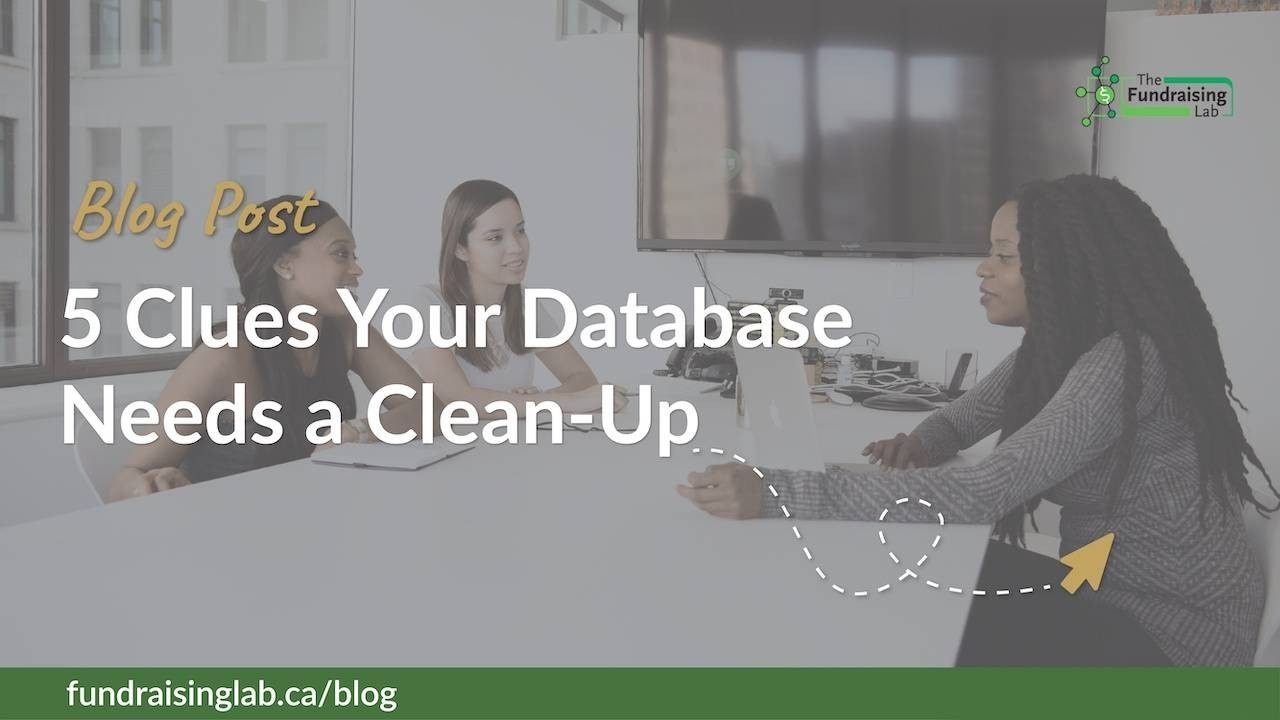5 Clues Your Database Needs a Clean-Up - Plus a Bonus Clue!

Oh data…we love you but why is our relationship a struggle sometimes?

You know, every client we’ve ever worked with needed to work on their data. So if you feel like your data needs some work…
You. Are. Not. Alone.
Your database can do so many important things…if it is well configured.
We have a lot of clients vociferously tell us just how bad their donor database is. When we ask a few more questions, we usually discover that they are using a not bad off-the-shelf donor database software system.
But invariably, what we find when clients complain about their database is that the system was set up poorly.
Databases need to be configured or set up to be used effectively. But it’s not a simple task. And frankly, not many folks have the blend of skills to configure a database to allow you to do all of the things you want it to do:
- measure fundraising performance against your fundraising plan targets
- talk with finance
- create reports to show senior leadership how the fundraising program is doing.
It’s complicated.
And we generally assign the database to entry-level staff and don’t offer them the kind of support they need to make sure our most valuable asset – data – is well used.
Here are some clues that may point to your database needs some clean-up and attention:
Clue #1: You do not reliably know how many donors your system contains.
This might be for a couple of reasons:
- It contains many duplicate records
Solution: Invest the time in doing a big merge/purge
- You have more than just donor records in the system (volunteers, clients, other constituents) but they are not coded in a way that makes it easy to determine who is a donor and who is another type of constituent
Solution: Invest your time in digging into your donor groups and cleaning up how constituents are coded in your system. That is, what is the mechanism in your system to define that someone is a volunteer or a client or a foundation or corporation or an individual, etc.
Clue #2: You can’t pull meaningful reports.
Your system has the ability to pull reports but when you try to run them, you are not getting the information you expect to. The credibility of the fundraising program can suffer if you’re unable to share what should be a pretty basic measurement such as funds raised.
Solution A: This could be related to not having the right donor groups and donations coding structure set up. So, when you enter donations, you may be entering the donor’s information and donation amount, but are you also tracking what appeal the donor responded to (i.e., was it a direct mail letter, a face-to-face ask, or grant?) and are you tracking where the money should be spent (is the donation an unrestricted gift or designated to a program?)
Solution B: If you’ve invested the time in cleaning up your donor groups and coding structure, then it’s likely you are not including the correct criteria for your reports. Take a look at your report criteria.
Clue #3: Your database’s financial information about the funds you’ve raised doesn’t come close to matching what finance says you’ve raised.
Your numbers say you’ve raised a certain amount. The finance numbers tell a different story.
Solution: Create a robust reconciliation process between your system and the finance system so that you can ensure that each month what you have recorded matches with finance. The truth is that the finance team is the final arbiter because it must reconcile with – or compare itself to - the bank statement.
Clue #4: You can’t tell from the data how a particular campaign did in the past.
If I asked you how much money you raised from your direct mail campaign or a particular special event, you can’t. Or you can, but only because you have it tracked in a separate excel spreadsheet.
Solution: Set up your coding structure to include appeals, campaigns, funds and enter data using all of these codes.
Clue #5: The info you can pull from the database has little or no relationship to your fundraising plan and budget.
Solution: You have to code the database to match your fundraising plan and budget. Your fundraising plan, your budget and your database should all be aligned. And, the budget should be aligned with the finance system’s coding system, too. There are a lot of moving parts.
Bonus Clue #6: It just seems to be a dog’s breakfast, and no one really knows what’s happening.
This is a trick clue. This isn’t the fault of the database. It’s probably because there have not been any systems or processes about how to enter data. And maybe you have had multiple people entering data over the years without any data entry protocols. And those people may have been a combination of staff and volunteers.
Solution: You need to develop systems, processes and protocols. You need to have trained people doing the data entry. And you need checks and balances to make sure the data being entered is accurate.
***
Look, configuring your database well requires A TON of expertise. And it can be a lengthy process. And it intersects with your finance team, so you have to make sure you’re working with them on it, too. It’s complex and has far-reaching consequences and implications if it’s not done well.
Even if you’re a small business or charity, data should be a big deal.
So, here is my challenge to you: become a champion for data. I hope that you can help elevate it to the place of importance it deserves to hold.
Speaking of elevating to the place of importance it deserves to hold, having a fundraising plan in place – with a plan that includes having good data – is a cornerstone to raising more money for your organization.
This Monday, the 18th, our course, Planning with Purpose begins. And in a quick 8 weeks with only two to three hours per week commitment, you’ll walk away with:
- A fundraising plan and budget
- Insight into systems and processes to improve outcomes
- Improving current fundraising initiatives and incorporating new ones
- Experience in pitching to a board and building allies
- A guide along the way and 8 live Q&A sessions
- Master Classes in Data Management and Building a Case Statement
Ya, and…?
If you take this course, you will focus on all of your fundraising initiatives (not just the ones you’re good at). You will know what works and what doesn’t work, what you want to drop and what you want to grow. You’ll be guided by a realistic budget. Your plan will be realistic, actionable and achievable.
AND you will raise more money for your organization.
Who doesn’t want that?
Sign up today. We start on Monday.
Yours in kick-a$$ fundraising,
Cathy and the team at The Fundraising Lab
P.S. We’ve partnered with AFP and if you’re working towards your CFRE, this course will give you 12.75 points. Find out more.

